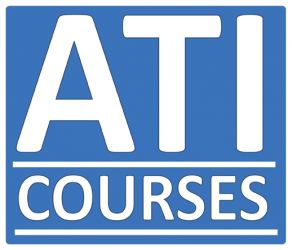ATI's Digital Signal Processing System Design course
This four-day course is intended for engineers and scientists concerned with the design and performance analysis of signal processing applications. The course will provide the fundamentals required to develop optimum signal processing flows based upon processor throughput resource requirements analysis. Emphasis will be placed upon practical approaches based on lessons learned that are thoroughly developed using procedures with computer tools that show each step required in the design and analysis. MATLAB code will be used to demonstrate concepts and show actual tools available for performing the design and analysis.
What you will learn:
- What are the key DSP concepts and how do they relate to real applications?
- How is the optimum real-time signal processing flow determined?
- What are the methods of time domain and frequency domain implementation?
- How is an optimum DSP system designed?
- What are typical characteristics of real DSP multirate systems?
- How can you use MATLAB to analyze and design DSP systems?
From this course you will obtain the knowledge and ability to perform basic DSP systems engineering calculations, identify tradeoffs, interact meaningfully with colleagues, evaluate systems, and understand the literature. Students will receive a suite of MATLAB m-files for direct use or modification by the user. These codes are useful to both MATLAB users and users of other programming languages as working examples of practical signal processing algorithm implementations.
Course Outline:
- Discrete Time Linear Systems. A review of the fundamentals of sampling, discrete time signals, and sequences. Develop fundamental representation of discrete linear time-invariant system output as the convolution of the input signal with the system impulse response or in the frequency domain as the product of the input frequency response and the system frequency response. Define general difference equation representations, and frequency response of the system. Show a typical detection system for detecting discrete frequency components in noise.
- System Realizations & Analysis. Demonstrate the use of z-transforms and inverse z-transforms in the analysis of discrete time systems. Show examples of the use of z-transform domain to represent difference equations and manipulate DSP realizations. Present network diagrams for direct form, cascade, and parallel implementations.
- Digital Filters. Develop the fundamentals of digital filter design techniques for Infinite Impulse Response (IIR) and Develop Finite Impulse Response filter (FIR) types. MATLAB design examples will be presented. Comparisons between FIR and IIR filters will be presented.
- Discrete Fourier Transforms (DFT). The fundamental properties of the DFT will be presented: linearity, circular shift, frequency response, scallo ping loss, and effective noise bandwidth. The use of weighting and redundancy processing to obtain desired performance improvements will be presented. The use of MATLAB to calculate performance gains for various weighting functions and redundancies will be demonstrated.
- Fast Fourier Transform (FFT). The FFT radix 2 and radix 4 algorithms will be developed. The use of FFTs to perform filtering in the frequency domain will be developed using the overlap-save and overlap-add techniques. Performance calculations will be demonstrated using MATLAB. Processing throughput requirements for implementing the FFT will be presented.
- Multirate Digital Signal Processing. Multirate processing fundamentals of decimation and interpolation will be developed. Methods for optimizing processing throughput requirements via multirate designs will be developed. Multirate techniques in filter banks and spectrum analyzers and synthesizers will be developed. Structures and Network theory for multirate digital systems will be discussed.
- Detection of Signals In Noise. Develop Receiver Operating Charactieristic (ROC) data for detection of narrowband signals in noise. Discuss linear system responses to discrete random processes. Discuss power spectrum estimation. Use realistic SONAR problem. MATLAB to calculate performance of detection system.
- Finite Arithmetic Error Analysis. Analog-to-Digital conversion errors will be studied. Quantization effects of finite arithmetic for common digital signal processing algorithms including digital filters and FFTs will be presented. Methods of calculating the noise at the digital system output due to arithmetic effects will be developed.
- System Design. Digital Processing system design techniques will be developed. Methodologies for signal analysis, system design including algorithm selection, architecture selection, configuration analysis, and performance analysis will be developed. Typical state-of-the-art COTS signal processing devices will be discussed.
- Advanced Algorithms & Practical Applications. Several algorithms and associated applications will be discussed based upon classical and recent papers/research: Recursive Least Squares Estimation, Kalman Filter Theory, Adaptive Algorithms: Joint Multichannel Least Squares Lattice, Spatial filtering of equally and unequally spaced arrays.
Speaker and Presenter Information
Dr Joseph G. Lucas has over 35 years of experience in DSP techniques and applications including EW, sonar and radar applications, performance analysis, digital filtering, spectral analysis, beamforming, detection and tracking techniques, finite word length effects, and adaptive processing. He has industry experience at IBM and DSR with radar, sonar and EW applications and has taught classes in DSP theory and applications. He is author of the textbook: Digital Signal Processing: A System Design Approach (Wiley).Relevant Government Agencies
Air Force, Army, Navy & Marine Corps, DOD & Military, Dept of Education, Dept of the Interior, Dept of Transportation, NASA, Other Federal Agencies, State Government, CIA, Coast Guard, National Institutes of Health, Census Bureau, USAID
This event has no exhibitor/sponsor opportunities
When
Mon, May 30 - Thu, Jun 2, 2011, 8:30am - 4:30pm
Where
Doubletree Hotel Columbia
5485 Twin Knolls Road
Columbia, MD 21045
Get directions
Website
Click here to visit event website
Organizer
ATI Courses





